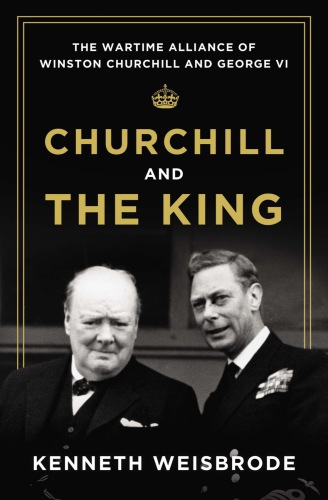
Churchill and the King
The Wartime Alliance of Winston Churchill and George VI
کتاب های مرتبط
- اطلاعات
- نقد و بررسی
- دیدگاه کاربران
نقد و بررسی

September 9, 2013
Historian Weisbrode (On Ambivalence: The Problems and Pleasures of Having It Both Ways) shares the story of how two of the most important figures in 20th-century Britain, Churchill and King George VI, worked tirelessly to maintain British interests throughout WWII. Though told with humor, Weisbrode presents lackluster evidence to support his notion that the king’s role during the war was on the level of Churchill’s. Throughout, readers will get to know Churchill’s eccentric personality, his successes and failures, but relatively little of the king’s. Indeed, there are similarities between the two men’s natures and opinions, but the story proves to reveal parallel, if complementary, lives instead of comparable powers. Only at the end of the book does Weisbrode make good on his belief in the pair’s significant partnership: “after reconstructing the history of the two men in tandem it becomes very difficult to imagine Churchill succeeding in that without the full support of the king.” Furthermore, many anecdotes feel unfinished, or contain British-isms Americans are unlikely to understand. The friendship that grew between these two historical figures makes for an uplifting story, but not an entire book.

October 1, 2013
An organic comparison of two highly flawed and deeply sympathetic characters at the helm of England at her most perilous hour. Historian Weisbrode (On Ambivalence: The Problems and Pleasures of Having it Both Ways, 2012, etc.) navigates among the infinite accounts already existing on Churchill and the House of Windsor for a touching dual portrait of two historical characters whose greatness largely relied on the support of the other. The recent film The King's Speech brought out the painfully human shortcomings of King George VI, "Bertie," who always expected his big brother to become king and certainly wasn't educated for the role. Churchill, although remembered as the country's savior during World War II, had spent many years previously in the political wilderness. Both men had endured terrible school years and a deep-seated anxiety of influence vis-a-vis their fathers. Both had to step up patriotically to fill the vacuum created by political crisis: Edward VIII's abdication dropped the royal hot potato in his younger brother's lap, and Churchill was the only one capable of running the government after the disgrace of Neville Chamberlain. Although Churchill (not then in power) had urged Edward not to abdicate, it is hard to imagine how the prime minister would have minded such a king "with appeasement in the air and his integrity thrown into question." Churchill and Bertie met for weekly luncheons during the war, with or without the queen; both men used language very deliberately; both had few intimates around them ("they were essentially friendless," writes the author) but relied on the asymmetry of their relationship and the urgency of official duty to build "an armature of knowledge and trust." Weisbrode makes a very compelling case that each man was "working against his own faults, on behalf of the other." An inspired, engaging comparative portrait.
COPYRIGHT(2013) Kirkus Reviews, ALL RIGHTS RESERVED.

September 1, 2013
When we think of Britain's resistance to German bombing in WWII, the bulldog face of Winston Churchill comes to mind. As prime minister, he not only led the country in its darkest hour but also, greater than that, provided inspiration for the beleaguered populace to hunker down and persevere. But as this author establishes, that was only part of the picture. The full truth is that Churchill had a partner in guiding the country through those difficult times, King George VI, the shy prince who reluctantly inherited the throne from his colorful older brother, Edward VIII, when the latter abdicated in 1936 for reasons of the heart. Age and background differences between the two men melted away as prime minister and king built a relationship of trust and respect as the war went on and on. Why this alliance worked so wellfor the two men personally and, in a larger context, for the benefit of Britainis analyzed in terms of the two men's personality traits and qualities that challenged and stimulated both of them to be, and do, their finest.(Reprinted with permission of Booklist, copyright 2013, American Library Association.)

























دیدگاه کاربران